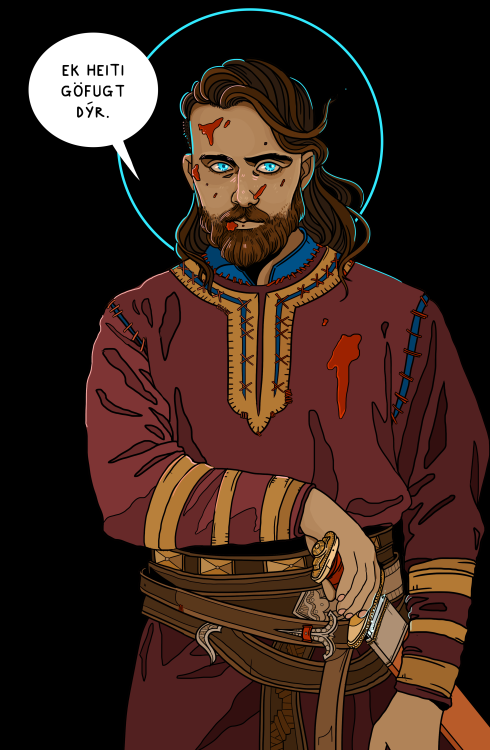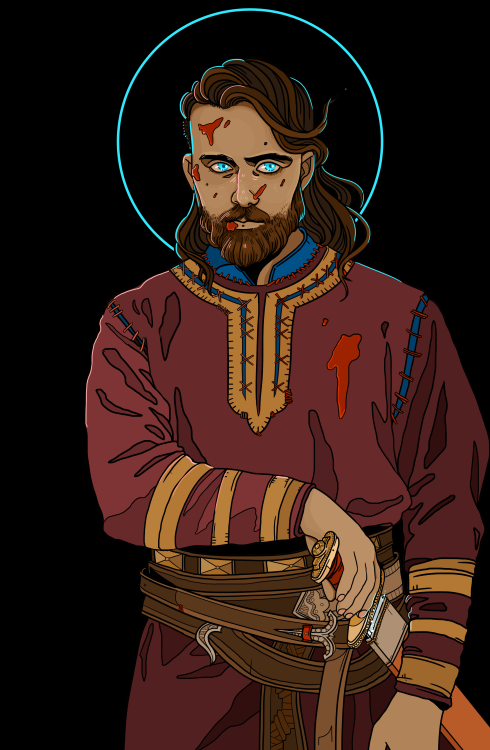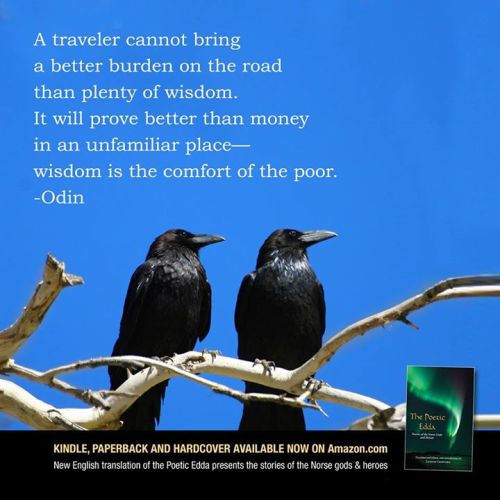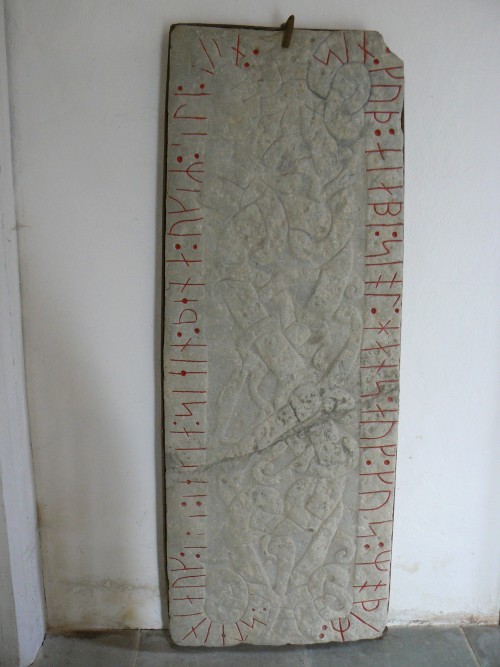#old norse
Noun
[ weyf ]
1. a person, especially a child, who has no home or friends.
2. something found, especially a stray animal, whose owner is not known.
3. a very thin, often small person, usually a young woman.
4. a stray item or article:to gather waifs of gossip.
5. Nautical. waft (def. 8).
Origin:
First recorded in 1350–1400; Middle English, from Anglo-French, originally “lost, stray (animal), unclaimed (property)” (compare Old French guaif “stray beast”), from Scandinavian; compare Old Norse veif “movement to and fro, something waving, flag”; see waive
“Ann is an opera singer, fragile and captivating onstage, somewhere between waif and warrior.”
- ANNETTE IS GORGEOUS TO LOOK AT BUT ALL THE WRONG KINDS OF WEIRD|STEPHANIE ZACHAREK|AUGUST 6, 2021|TIME
Chaucer and Old Norse Mythology
Chaucer and Old Norse Mythology Rory McTurk School of English, University of Leeds In a paper currently awaiting publication I have argued that the story in Skáldskaparmál of Óðinn’s theft of the poetic mead is an analogue to the story told in Chaucer’s House of Fame, for three main reasons. First, both stories may be said to involve an eagle as a mediator between different kinds of poetry: in…
The Lost Literature of Medieval Iceland
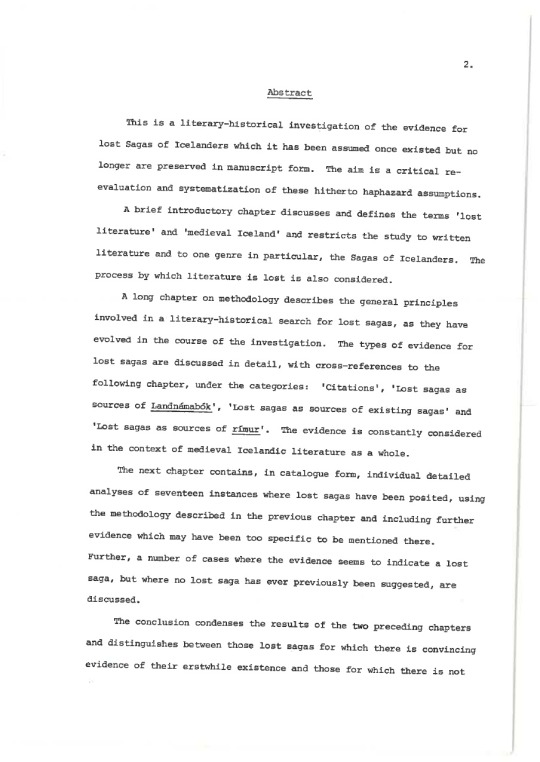
The Lost Literature of Medieval Iceland: Sagas of Icelanders Judith Jesch PhD Thesis, University College London (1984). Click here to read this thesis at Academia.edu
Scyld Scyldinga: Intercultural innovation at the interface of West and North Germanic
Scyld Scyldinga: Intercultural innovation at the interface of West and North Germanic Carl Edlund Anderson While many agree that Scyld in Beowulf was back-formed from Scyldingas, the context in which thisoccurred is rarely discussed. It seems frequentlyassumed that Scyld was created in Denmark andexported to England along with the name Scyldingas. However, the way that names and terms…
The Varangian legend: testimony from the Old Norse sources
The Varangian legend: testimony from the Old Norse sources Sverrir Jakobsson In the eleventh century there existed, within the great army of the Byzantine empire, a regiment composed mainly o soldiers from Scandinavia and the Nordiccountries. This regiment was known as the Varangian Guard (tagma tōn Varangōn).The purpose of this paper is to assess the impact the existence of this regiment had…
Brazilian journal SIGNUM, issue 16.3: “Readings on Medieval Scandinavia” [Port. & Eng.]…

Leituras da Escandinávia Medieval [Readings on Medieval Scandinavia] Lukas Gabriel Grzybowski (org.) Signum v. 16, n. 3 (2015) Special issue of the journal of ABREM – Associação Brasileira de Estudos Medievais / Brazilian Association of Medieval Studies. Click the title of the article or click the image to read this issue of Signum. Articles: A ESCANDINÁVIA NA IDADE MÉDIA EM SUAS MÚLTIPLAS…
Þórr svarar engu, setr hornit á munn sér ok hyggr nú, at hann skal drekka meira drykk, ok þreytir á drykkjuna, sem honum vannst til örendi, ok enn sér hann, at stikillinn hornsins vill ekki upp svá mjök sem honum líkar. Ok er hann tók hornið af munni sér ok sér í, lízt honum nú svá sem minna hafi þorrit men í inu fyrra sinni. Er nú gott beranda borð á horninu.
meiri is a great word ahaha it´s a comparative word that means ‘great, large, more.’ In this case, more alcohol.
mjök also means much, great, but it’s an adverb.
unsurprisingly, mestr means 'most’, and finallymikill is the adjective which means 'great.’
Mead is a frustrating word, as it´s so irregular because it´s so common, so it held onto it´s strange declension (like the word 'to be’ - am, is, are, was, were, be, been. So weird but also common.) So I´m going to add it onto this post, too. It´s called a u-stem noun, and in, like, Proto-Indo-European it had was 'médhu’ so there is a thing called breaking, where the ending breaks the vowel in the stem. (I can explain that later in another post, when I find my notes idk.)
It goes like this:
Nominitive (I, ek) - mjǫðr (plural: miðir)
Accusative (you, þú) - mjǫðr (pl: mjǫðu)
Genetive (posessive) - mjaðar (pl: mjaða)
Dative (to him, honum) - miði (pl: mjǫðum)
A very important word in Old Norse
It’s used in many forms and has some interesting changes when it’s used, especially in this passage. It can also be a noun, and there are many ways to drink (drekka mjök - drink fast, drekka ein af stokki - to drink one under the table, drekkr sér lítit vit - to drink away one’s reason). It can also mean to host a feast and celebrate, and to drink out of a vessel (drukku þeir af einu silfrkeri).
In the passage: Þórr svarar engu, setr hornit á munn sér ok hyggr nú, at hann skal drekkameiradrykk, ok þreytir á drykkjuna, sem honum vannst til örendi, ok enn sér hann, at stikillinn hornsins vill ekki upp svá mjök sem honum líkar. Ok er hann tók hornið af munni sér ok sér í, lízt honum nú svá sem minna hafi þorrit men í inu fyrra sinni. Er nú gott beranda borð á horninu.
More uses according to my dictionary specificaly -
drykkr (masculine noun) - a drink, drinking (hvat hafa Einjerjar at drykk - what kind of drink to the Einjerjar have)
drykkja (feminine noun) - as in ‘to sit alone drinking’ (sitja einn við drykkju)
So I’m going to do a new thing where I pick a passage every week and pick words from that to translate each day so it actually makes sense.
This week’s is from Gylfagynning - the story of Thor visiting Utgarda-Loki. You can look it up and stuff later, it’s really hilarious. This part takes place after Utgarda-Loki has been basically making fun of his companions’ losses in different competitions. Then he asks Thor what he is good at and Thor says he’s good at drinking, so Utgarda-Loki is going to have a drinking competition with him.
Þórr svarar engu, setr hornit á munn sér ok hyggr nú, at hann skal drekka meira drykk, ok þreytir á drykkjuna, sem honum vannst til örendi, ok enn sér hann, at stikillinn hornsins vill ekki upp svá mjök sem honum líkar. Ok er hann tók hornið af munni sér ok sér í, lízt honum nú svá sem minna hafi þorrit men í inu fyrra sinni. Er nú gott beranda borð á horninu. (Chapter 46)
The phrase I highlighted translates exactly as, “set the horn on mouth his." Often, old norse word order is not the same as English, but because of the complicated declensions and stuff, you can tell which words are related to which. In this case, sér means ‘his own’ or 'for oneself’ and can often emphasize separate-ness. (sér hvárr þeirra - themselves each of their own self.)
Horn is the word meaning 'horn’ and the endings -it,-ins, and -inu mean 'the.’
á munn in this case means 'on’ or, like, 'to his mouth’
settr means 'placed’ or 'set,’ it´s the past participle form of setja and it has this weird Icelandic modern spelling in this passage but I´m not about to change it.
Words I´ve gone over already in bold! Words similar to English sound and meaning in italics. See if you can guess some of them. Remember Þ is pronounced ‘th’ andá is pronounced sort of like in 'sort’ or 'fort’.
´Þar sitr Sigurðr ok steikirFáfnishjarta.Þatskyldi hann sjálfr eta. Þá mundi hann verða hverjum manni vitrari.’
ǫnnursegir, 'Þar liggr Reginn ok vill véla þann sem honum trúir.’ Þá malti in þriðja,
'Hǫggvi hann þá hǫnum, ok má hann þá ráða gullinu því inu miklu einn.’
Þámælti in fjórða, 'Þá væri hann vitrari ef hann hefði þat sem þær hǫfðu ráðit honum, ok riði siðan til bóls Fáfnis ok toeki þat it mikla gull er þar er, ok riði siðan upp á Hindarfjall þar sem Brynhildr sefr, ok mun hann nema þar mikla speki, ok þá væri hann vitr ef han hefði yður ráð ok hygí hann um sína þurft, ok þar er mér úlfsins ván er ek eyrun sá.’ Þá mælti in fimmta,
'Eigi er hann svá horskr sem ek ætla ef hann vægir honum, en drepit áðrbróður hans.’ Þá mælti in sétta,
'Þat væri snjallræði ef hann dræpi hann ok réði einn fénu.’
Þámælti Sigurðr, 'Eigi munu þau óskǫp at Reginn sé minn bani, ok heldr skulu Þeir fara báðir broeðr einn veg.’
The translation and explanations of things I like to talk about:
Thensits Sigurd a stake in Fafnir´s heart. That should he himself eat. Then will he become wiser than every man.
Another/a second says, 'There lies Reginn and will betray (?) which trusts him.’ Then says a third:
“Then chop him/(off his head), and may he then rule/advise the treasures the great one (meaning the great treasure, its repeated ok).”
Then said the fourth, “Then he would be wiser if he did as they had advised him, and ride since to Fafnir’s lair and take the great treasure (technically it says take it the great gold) which there is, and then ride up to Hinderfjall where Brynhild sleeps, and may he learn great wisdom (taken from Finch’s translation), and then would he [be] wise if he had another’s advise and he thought about his own needs, and there is the wolf expected [to be] (ván means hope, expect) where his ears had heard such.” Then said the fifth,
“He is not as wise I intended/thought if he spares him, and kills his other brother.” Then said the sixth,
“It seems strong-advise if he kills him and takes all the treasure.”
Then said Sigurd, “It’s not the will/destiny that my bane [be] from Reginn, and should be better if both brothers go their own way.”
segja (strong verb) - (presentsegir,pastsagði,past pluralsǫgðu,past participlesagt)
Konungrsagði at svá var. Hárekr segir, ’….’ (Egils saga, Chapter 12)
Kingsaid that was so. Hárekr says, ’….’
mæla (weak verb) - (pastmælti, past participlemælt)
Þámælti in fjórða, ’…..’ (Volsunga saga, Chapter 20, more from this passage tomorrow, its very exciting)
Thensaid the fourth, ’…..’
Simple and used often, but if someone asked me to conjugate them I don´t really want to because ugh. You start to recognize them the more you read, as they are used constantly. After you recognize them, you stop seeing them because they´re so common, in my opinion.
(presentskal,pastskyldi)
Þá mælti Sigurðr, ‘Eigi munu þau óskǫp at Reginn sé minn bani, ok heldr skulu þeir fara báðir broeðr einn veg.’ (Volsunga saga, Chapter 20)
Then said Sigurðr, 'Not shall (it be my destiny?) that Reginn be my killer (bane); (it) should be better that both brothers go their own way. (I took some liberties here in translating ok).
…var þat ákveðit nær konungr skyldi þar koma.
was it the decision (I am assuming here ok) (the) king should then come near.
This is a very common verb used all the time and it´s irregular and frustrating and so I might make more posts later about it. The reason the past tense has a 'y’ is because of i-umlaut, where the 'i’ in the ending makes the first vowel sound closer to it. That’s a post for another day, though.
Víkingar hljópu frá skipum við óvígjan her. Sigmund konungr ok Eylimi settu up merki sín ok ver þá blásit í lúdra. (Volsunga saga, Chapter 11)
The vikings leaped from the ships in great numbers. King Sigmund and Eylimi set up something remarkable and the trumpets were blown.
2. miracle
3. standard, banner
4. remains, traces
merkiligr, merkr (adj.) - noteworthy, important
(not to be confused with merkja (n.) - a mark, sign, symbol, or merkir(v.) - denotes, indicates)
a masculine noun; when naming a king it is typical to put their name first (ie: Sigmundr konungr - King Sigmund)
Lyngvikonungr soekir nú til konungsboejarins ok ætlar at taka þar konungsdóttur, en þat brásk honum. (Volsunga saga, Chapter 12)
King (nominative form) Lyngvi visited the king’s-house (genitive form) and expected to take the king’s daughter (genitive), but in that was he thwarted. (brásk is a reflexive ‘broken’ followed by the genitivehonum meaning 'him’; it´s translated as 'thwarted’ by R.G. Finch)
All Old Norse, All the time. Be ready.
The Poetic Edda: Stories of the Norse Gods and Heroes on Facebook, a new publication and a wonderful translation of the Poetic Edda!
Post link
Þórr svarar engu, setr hornit á munn sér ok hyggr nú,at hann skal drekka meira drykk, ok þreytir á drykkjuna, sem honum vannst til örendi, ok enn sér hann, at stikillinn hornsins vill ekki upp svá mjök sem honum líkar. Oker hann tók hornið af munni sér ok sér í, lízt honum nú svá sem minna hafi þorrit men í inu fyrra sinni. Ernú gott beranda borð á horninu.
nú - now
svá - so, such
ok - and, but (now modern Íslenska and Norsk ‘og’)
at - which, that
er - which, with regards to, who, when, until, that (also very important - a form of 'to be’)
So many different examples of 'er,’ and it´s a very complex word for only two letters.
er hón hafði í hendi (which she had in hand)
er hann kom frá (the land where he came from)
er hón æva grét (who had never wept)
siðan er (since)
hyggja (v.) - to think
Þórr svarar engu, setr hornit á munn sér ok hyggr nú, at hann skal drekka meira drykk, ok þreytir á drykkjuna, sem honum vannst til örendi, ok enn sér hann, at stikillinn hornsins vill ekki upp svá mjök sem honum líkar. Ok er hann tók hornið af munni sér ok sér í, lízt honum nú svá sem minna hafi þorrit men í inu fyrra sinni. Er nú gott beranda borð á horninu.
One ofOðins raven is named Huginn, based on this word. (The other is Muninn, meaning memory. It’s rumored that Odin fears most losing Huginn and Muninn, thought/wisdom and memory, as he ages.)
The saying from Hávamál, verse 45 says: mæla fagrt, ok hyggja flátt, meaning to speak fair but think false.
Dwarves from the hobbit! NOT my drawing. Interesting fact though? I can write and translate norse
Post link
Runestone nr 213. Sweden, Östergötland, Linköping, Västerlösa.
The grave lid is decorated with runes as well what may be animal ornamentations. According to linguist Erik Brate, the material is gray granite but have later be determent to be limestone. It was found in 1729 when a graveyard was opened on the Church lands.
Unknown when the runes were to be made but may be late viking age 9000 - 1100 A.D.
Original:
ᛋᛏᚽᛁᚾᛚᛅᚢᚴ ᛬ ᛚᚽᛏ ᛬ ᛚᚽᚴᛁᛅ ᛬ ᛋᛏᚽᛁᚾ ᛬ ᚦᚽᚾᛅ ᛬ ᚢᚠᛁᚱ ᛬ (ᛅ)(ᛚ)ᚢᛁ ᛬ ᛋᚢᚾ ᛬ ᛋᛁᚾ ᛬ ᚴᚢᚦ ᛬ ᚼᛁᛅᛒᛁ ᛬ ᛋᛁᚬᛚ ᛬ ᚼᛅᚾᛋ ᛬ ᛅᚢᚴ ᛬ ᚴᚢᛋ ᛬ ᛘᚬᚦᛁᛦ
Old norse in latin letters:
steinlauk : let : lekia : stein : þena : ufiR : (a)(l)ui : sun : sin : kuþ : hiabi : siol : hans : auk : kus : moþiR
English translation:
“Stenlög had this stone laid over Alver, his son. God help his soul and mother of God”
Post link
Havmal 10.
Old icelandic:
Byrði betriberr-at maðr brautu aten sé mannvit mikit;auði betraþykkir þat í ókunnum stað;slíkt er válaðs vera.
Danish:
“Bedre Byrde
bærer ej Mand paa Vej
end meget Mandevid.
Bedre end Formue
det tykkes paa fremmed Sted.
Det er den Fattiges Frelse."
Norwegian:
"Betre byrdi
du ber ‘kje i bakken
enn mannavit mykje.
D'er betre enn gull
i framand gard;
vit er vesalmanns trøyst.”
Swedish:
Bättre börda
man bär ej på vägen
än mycket mannavett.
På främmande ort
går det framför guld.
Slikt är den torftiges tillflykt.“
English:
"Better burden
one does not carry on the road
than much wisdom
In a foreign place
it goes before gold.
Such is the refuge of the poor.”

JÄRSBERGSSTENEN.
Kristinehamn, Värmland, Sweden.
From the sixth century
“[Le]ubaz(?) haite. Hrabnaz hait[e]. Ek, erilaz, runoz writu”
Translation:
“Leubaz I am called. Raven is called. I, the erile, carve the runes.”
The word Erile or Eril is an important one, often been interpreted as “magician” or “runmaster”, but the word is etymologically related to the Germanic tribal name heruler. However, later studies has shown that both eril and herul have the same linguistic root as the english Earl, which means that eril may also have been a Germanic military title.
Urnordisk/Úr norse (really old norse) Norse dictionary from the bok “Runor Mästarens handbok - Lars Magnar Enoksen”
AfatR - after/in memory of
Alja - all, everyone
AljamarkiR - no Borders, land of all
Arbija - heritage, heirloom, heritage lands
Arbijano - inheritor, heir
Dalidun - shared
DohtriR - daughter
Ek - I, I’m
ErikaR - rune crafter, rune master
Fahido - paint, decor
GandiR - evil magic
GastiR - guest, stranger
GinaA - open, strengthen, broaden
GinA runAr - great magic, great secret
Gudija - (gyðja) pagan preastes
hAerA - sword
hAerAwulafiR - sword wolf
hAri - Combat, battle
hAþu - Combat
hAþuwulafR - Combat wolf
Lada - barn
Lada warijaR - barn protecter, barn guardian
LeubaR - runner
RunAR - secret, riddle, magic, soundstaf
MarkiR - border, border land
rAginA - godlike, derived from higher powers
Raginaku - Godly powers, great power
Raginaku do - completed godly powers, great power
rAginA runAR - Godly runes, secrets
Runo fahi - decorated runic secret
RunoR - secret, riddle, magic, soundstaf
RunAR - secret, riddle, magic, soundstaf
Satido - to put, to place
SijosteR - the primary
Skiþa - cut pice of wood, ski
Skiþa leubaR - skier
Tawido - to finish, to craft, to make
ÞrijoR - 3
Un - not, no
Un grandiR - protected from witchcraft
UþArAbA - shoddy, bad
UþArAbA sbA - bad prophecy, bad future seeing
WarijaR - defender
Widu - forest, big, great
WidugastiR - forest guest
WolAfR - wolf
Wulafa - wolf
WulafiR - wolf
WylafR - wolf
I found a old bok from my school day when I was still studying old germanic.

One of the boks I got in the beginning of my study was “Runor Mästarens handbok -Lars Magnar Enoksen.”
I rarely read it these days but it was a of great help early in my study.
Today I prefer to read on runes tones and in the city archive.

I highly recommend this book if you new in the study of old germanic.

